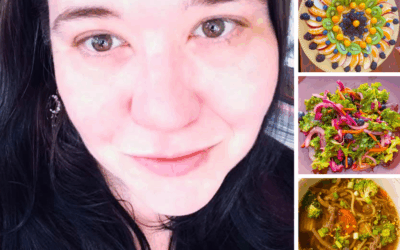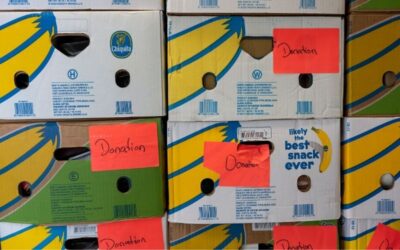Conversation with Director of Shelter & Community Services L’Tonya Johnson
The Haven welcomes and introduces L’Tonya Johnson, MSW Licensure Candidate, as our new Director of Shelter & Community Services. L’Tonya joins us from Dartmouth Health Children’s where she served as Social Worker in the Intensive Care Nursery. L’Tonya is a teacher, an advocate, and a strategic planner who hopes to utilize her experience in needs-based organizations and social work to lead the Haven’s Shelter Services, Service Coordination, and our Children’s Programming.
“I hope to offer a good mix of building strategic partnerships that will enhance the services here and that I can be a resource to our existing leaders and growing leadership as we acquire new programs or make existing programs better. Social work and needs-based work has a history of burnout. It’s a profession that needs lots of support, leadership and professional development, and creative solutions about how we tackle hard problems.”
L’Tonya likes to garden, specifically flowers, travel, eat and cook food, and enjoy a good conversation. Being from the South, she says she has a “porch mentality” where everyone can stop by, sit back and have a nice chat. Below is one of those nice chats L’Tonya had with Communications Assistant Isaac.
What were you doing at DHMC?
“I served all the families whose babies were born unexpectedly early or were born with any long-term or short-term medical needs. Those families were challenged with the same things that everyone else is challenged with, and they had kiddos that needed extra special medical help.”
Oh, heavy.
“I don’t think it’s any heavier than the work we’re doing here at the Haven. In general, people working in Social Work are seeing individuals impacted by mental health, substance misuse, home and financial insecurity, childcare struggles, and health care access issues in our rural community.
What prompted the move to the Haven?
“I started out in needs-based non-profit work, much like this, just not with all the services in one spot. I worked in four target areas: adults with dual diagnoses – mental health and intellectual disability – that’s a big population we see here with the unhoused. I worked in families, needs-based a lot. I worked in educational services for children – needs-based kids with individual education plans, kids who are in afterschool programs, kids who need gap education in the summer. We do that here too with the children’s program. I’ve worked with all those populations in seeking housing, resourcing, and support work. When I read the overall job description, it had a lot of the populations that I had worked with in the past on it, and it was needs-based nonprofit work, which I feel particularly passionate about. At Dartmouth, I was able to expand my clinical exploration of mental health, SUD, and health care access, while being under good clinical supervision. That experience is allowing me to move forward in the process to being licensed as a Social Worker (LiCSW). This role was a combination of things I’ve done over the course of my career, and now a way to advance my clinical support of a great professional team. Another thing l love bout this role is that I get to use my partnership development skills. I am crafty at innovative solutions, strategic planning, leadership development and growth. I was hoping when I applied for the job, that it would be a good culmination of my resourcefulness and a nice next step to my career.”
In your short time here so far, what have you seen? And what are you hoping to do at the Haven?
“Any organization that’s dealing with all of these things at once really needs to have someone’s eyes on how we’re strategically handling the complexity of what we’re doing. I’m hoping that I can come alongside leadership, such as Becky, Christie and the director team be effective at successfully removing barrier for the un-housed. The people here are passionate, connected, and in-tune with their work.
“I really like that the organization has the ability to holistically look at the human, and offer some dignity to really hard, complex issues.”
How do you like to connect to people?
“Good conversation. I like gardening. I just like flowers. It’s a thing my grandma and I did together as a child. My family and I enjoy traveling. The Upper Valley is nice and scenic, so I’ve connected with people to go sightseeing or exploring many times. Honestly, I grew up in the South, so I have a porch mentality. Everybody sits, everybody chats. I have that kind of personality too! I feel most deeply connected with people when I sit talk and spend face to face time with them.”
Do you have a flower that you associate with your grandma? A favorite?
“She liked begonias, which I don’t love, but she had lots of begonias. It was her flower of her choice. I don’t know if I have a green thumb like her or my dad. What I like about gardening is the time spent. You don’t ever really get to slow down from day to day, but the garden allows for slowing down. So, now I garden with my child, Preston. We have a summer garden, and we have aquatic gardens at our house. We grow a lot of herbs. We usually grow things that we can eat or resource. In terms of flowers, we have roses, dahlias, and zinnias. My favorite flower is probably a hydrangea.
“There’re some zinnias out here in Haven’s Garden that I like, but I haven’t grown them myself. I am still aspiring! 😊 I’m good at vegetables. It’s hard with the winter and the dryness of the winter to keep house flowers alive. Mostly we do the aqua garden and that’s been successful. We do all kinds of herbs all year round. I just got into it like two years ago.
“We grow a lot of lavender at our house. Basil loves this area. So, lots of basil at our house. My kid is a fan of dipping bread, so olive oil basil, thyme. We grow all those.”
Yes, food is what I like to talk about! What do you like to make?
“We’re huge food people.
“If you come to our house, it’s kind of eclectic because my husband, Charles, is not from here. He’s from Nigeria. He spent most of his adult life there. So, he does Nigerian food. Every week, every day he cooks. And we argue about who cooks the best. We have a hodge podge meal variety because we really wanted our kiddo to experience both native Nigerian Foods and food from here. One of the reason, I started a garden is because we wanted him to see the food that we were going to eat. My husband’s diet is largely based on tomatoes, rice, stews, soup, and meat/fish. We grow a lot of tomatoes in the summer and try to grow a lot of peppers because my husband uses those to cook native dishes. We learned very early on, in our marriage, that there are some staple dishes that I make from the South that my husband will eat. I have this cabbage and sausage stir fry that they, both, really enjoy. We’re all corn people. Roasted corn, fried corn, all the corn. I don’t like corn bread, but I make it because they love it. I have a perfect banana bread recipe that all of our friends like, even my husband’s Nigerian friends.
“We didn’t want to discourage our kid from eating either type of food. So we try its all! I do a lot of my child’s meal prep because he must take food to school, but we both cook a lot. What we’ve agreed – because I don’t eat all the food that my husband cooks – we both agreed very early that we’d never discourage or express dislike of foods and always encourage trying new foods at our house.
“I used to live in China for a while, and there’s this egg and tomato dish. He enjoys that and I enjoy that. It’s called ‘Eggs and Tomatoes with Rice.’”
Wait, you lived in China?
“Yeah. I lived in China for 2.5 years. I was teaching. Sociological classes in English and world history.
“The Chinese say that China is shaped like a chicken. Can you envision that on a map? They always told me you live on the chicken’s back. If you think about the head of the chicken and you come down to the back, Inner Mongolia is there, and right underneath is Yinchuan. I lived in Yinchuan. In that city there’s a town called Ningda, and there’s a school called Ningda University. I taught at and lived on the chicken’s back for 2.5 years.
“The hotpot experience in China is amazing. Endless food, lots of conversation, and it’s a three-hour experience. Sit, drink, talk. That’s the way I got to know a lot of my students and colleagues. Food around the world. It’s a wonderful way to get to know people.”

